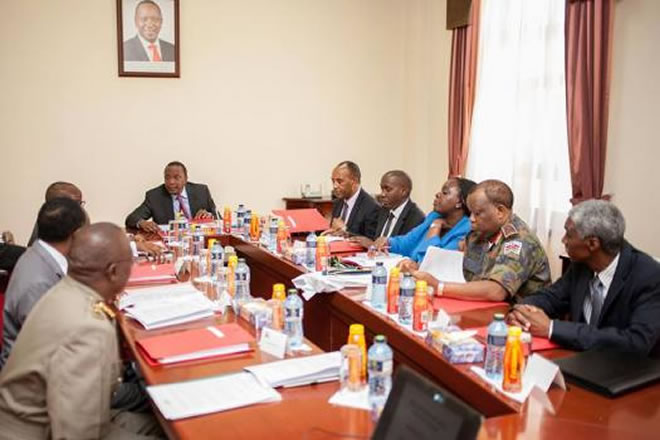
The National Security Council is the apex security body in Kenya and comprises the President, Deputy President, Heads of the Kenya Defence Forces, Kenya Police Service, National Intelligence Agency, and the Cabinet Secretaries of the Interior and Coordination of National Government, Defence, Foreign Affairs and International Trade, and The National Treasury.

By Chris Mgidu
Saturday, March 08, 2014
NAIROBI - Kenya’s top security organ has approved new security measures at the ever busy Jomo Kenyatta International Airport (JKIA) to help curb terror threats from Somali militants.
The National Security Council (NSC) which is chaired by President Uhuru Kenyatta said it has approved the construction of an integrated security screening facility on the approach to the JKIA.
“Once implemented, the project will also act as the coordinating point for the outer, perimeter intruder detection security systems, protection of the Kenya Pipeline Corporation Jet fuel depot,” NSC said in a statement received on Wednesday.
The NSC whose members are top police, military and intelligence chiefs, said the project will also act as security operations base camp for protection against the threat of man operated Anti- Aircraft Devices (MANPADS) on low flying aircraft.
The move comes as security forces are on alert following information that the Al-Shabaab terror group are planning to launch a series of attacks in key installations in Nairobi and Mombasa.
Secretary to the Cabinet Francis Kimemia last month circulated an alert to all senior government and police officers that the Al-Qaida allied group could be targeting key government facilities and popular public places which he said should be put under vigilance to foil any possible attack.
The country’s security apparatus in the regions have been ordered to scale up their security check and ensure that no one gets in or out of the country following last Sep-tember’s Westgate attack where the Al-Shabaab militia group claimed responsibility.
All major hotels, restaurants, bars and public service vehicle (PSV) operators across the country have also been directed to enhance their security by reviewing their security arrange-ments which include screening visitors.
The enhanced security also comes amid reports that some of the Kenyan youths who had crossed to the Horn of Africa nation to join the militants are now back in the coastal region after being discouraged by the constant military attacks on the militants’ strongholds and fallouts.
The NSC which met on Tues-day evening also expressed concern over the increased threats of radicalization and persistent conflicts among pastoral communities living in northern Kenya.
The NSC noted that the threat of radicalization was manifested in increased prevalence of radicalization centers, and particularly Masjid Musa and Sakina Mosques in Mombasa and Pumwani Riyadh Mosque in Majengo, Nairobi.
“NSC further noted with concern the impact of radica-lization on the political economic, social and security well-being of Kenya,” the statement said.
The apex security body resolved to enhance security measures to contain the radicalization threat by targeting persons (leaders) preaching and financing radicalization.
They also resolved to deal with economic hardships which lead to unemployment as well as im-plementing the counter radicali-zation strategy developed by the government.
The security body said they will engage the youth in gainful employment and intensify monitoring of all radicalization activities in the coastal region.
The youths have invaded several mosques and forcefully taken over leadership to preach Jihad sermons. Recent riots in the coastal city of Mombasa left at least four people dead and dozens others injured.
The government has warned of decisive action against the radicalization of Muslim youths believed to be behind runaway crime at the Coast.
The police said more border patrol will be intensified along the Kenya-Somalia border in Kiunga and Dadaad refugee camps to prevent the Al-Qaida-linked insurgents.
Kenya’s tourism has suffered a decline the number of tourists arriving since September 2011 when the Somali militant group, the Al-Shabaab, carried out the kidnappings of tourists in the Lamu archipelago and the kidnapping of the Spanish volunteers.
The port city, the capital Nairobi and other parts of Kenya have suffered a series of grenade attacks since the military incursion into southern Somalia.